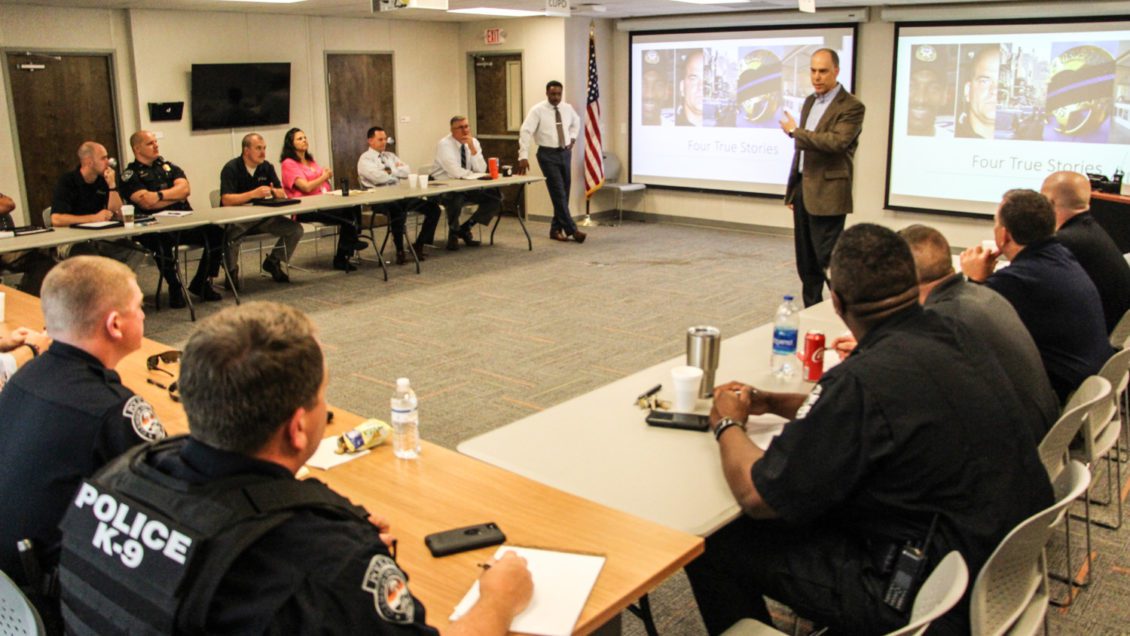On an annual basis, Healthy Campus sends out a notice on the dangers of alcohol and other drugs to Clemson’s student body. Serving as the marketing and informational arm of Student Health Services, the department also focuses part of its communication on the importance of active bystander intervention when a harmful or potentially harmful incident is witnessed. The memorandum challenges students to step up and do something about it, rather than staying quiet.
Students aren’t the only ones who have been challenged in today’s college environment, however.

The Clemson University Police Department (CUPD) joined in on the national conversation when it invited representatives Jonathan Aronie and Otha Sandifer from the EPIC program to campus May 23 and 24 for extensive training on the subject. Members of CUPD’s command staff were joined by leaders from the Clemson and Easley police departments Thursday and officers were part of the next day’s presentations.
“We’re excited to partner with the City of Clemson and Easley police departments to better expose our teams to some of the most critical issues facing law enforcement today,” said Associate Vice President for Public Safety and Chief of Police Greg Mullen. “We thank Jonathan and Otha for presenting to us how peer intervention is integrating with other skills and practices to enhance ethical policing.”
EPIC — Ethical Policing is Courageous — was first implemented in 2016 by the New Orleans Police Department. The program’s birth came just a few years removed from disturbing descriptions of the department as “broken” and “troubled” by powerful agencies such as the U.S. Department of Justice. Two years after its implementation, the department saw a 30-percent decrease in civilian complaints against its police officers.
EPIC became the nation’s first department-wide peer intervention program focused on preventing mistakes and misconduct before they occur. Aronie is a lawyer who works in the Government Contracts, Investigations & International Trade Practice Group for the Sheppard Mullin Richter & Hampton firm in Washington, D.C. He recently published an article detailing the program and how it helps officers identify warning signs of conduct for which an intervention may be necessary, how to gain the confidence and skills to intervene and the art of actually taking meaningful and safe action.

In the article, Aronie points out that a police department with a poor reputation of integrity and/or competence will have problems recruiting, retaining good officers and fighting crime. He also notes individuals who witness mistakes and misconduct and do nothing to prevent them put themselves at great risk of emotional and psychological stress.
“Peer intervention is something that empowers you to step in, the right way, and save someone from themselves,” Aronie said. “Every misconduct video I’ve ever had to review in my day job, multiple people have had opportunities to stop it but failed to act. EPIC provides officers with a skill that, when used correctly, can perhaps save a career or a life.”
Aronie and Sandifer shared four real-life examples of ethical dilemmas faced by police and discussed potential solutions. Aronie cited one example of a police officer in New Orleans who was spit on and cursed at and in an angry response began to charge at someone who was already handcuffed. An officer jumped out of his position in the room and cut him off, according to Aronie, not allowing the situation to escalate any further.
“It went from EPIC failure to EPIC success in a matter of seconds,” he said.
Sandifer is a member of the New Orleans Police Department, working as deputy superintendent for its Professional Standards & Accountability Bureau. He explained to Clemson’s team that police officers generally fall into one of three categories. The two smallest pieces of the pie, so to speak, are those who are ethically challenged — in that they find it difficult to speak up on anything — and saints, who abide by every rule in the book.
The third piece of the pie, Sandifer said, represents the majority of the police force.
“That’s where you have the rest of us,” he said. “We actually have the authority to step in and make a difference, to stop a colleague from making a mistake which may cost him or her a career.”

Sandifer also shared a slide describing common issues facing today’s police as a three-legged stool made up of misconduct, mistakes and health/wellness. Misconduct — for example, an officer being fired for using excessive force or simply being untruthful — is one of the leading causes of loss among the profession, along with suicide and line of duty deaths.
“Within ethical policing, we teach skills to intervene on an individual’s behalf,” he said. “We train for the physical part of the job by going to the shooting range, learning combat skills and so on. But we haven’t historically focused on the mental part nearly enough. EPIC gives us the means to do so.”
Theresa Singletary serves as CUPD’s director of administrative services and outreach and she sat in on the training Thursday. Among other things, she learned to gain awareness in any given situation, to have the confidence to be an active bystander and use perception and intervention techniques to possibly save a life.
She and Mullen said CUPD would be sending representatives to a two-day EPIC Executive Leadership Conference held June 20 and 21 at Loyola University New Orleans School of Law. Last year, more than 75 professionals from across the country attended the development workshop.
“This training was very eye opening,” Singletary said. “It was a lot of common sense material that we don’t often translate into actionable behaviors. I look forward to becoming more involved with the EPIC movement. The scenarios presented truly resonated with each individual in the room. It can change the culture of policing without changing the brotherhood, trust and loyalty our community holds in such high regard.”
Get in touch and we will connect you with the author or another expert.
Or email us at news@clemson.edu

